I went to see Interstellar by myself on a Friday night with a kid's pack from the concessions stand (the only affordable way to get a little bit of everything) and nothing better to do. I settled in for what I already knew was going to be a long movie, but what I was hoping would include some cool lady characters and more than a little science fiction landscape eye candy. I was not disappointed.
The movie is good. If that's all you're reading to find out, then you can go now. Interstellar is a perfectly competent, entertaining film. Matthew McConaughey does a credible job holding the movie together, though personally I did think he was outshone by Anne Hathaway and Jessica Chastain, who were the real stars of the movie. If you're generally a fan of Christopher Nolan's brand of slightly intellectual big budget action movies (like Inception and The Prestige and of course the Batman movies), then you're apt to like this one as well.
But that's not to say that the movie is perfect. It's largely what I was expecting. Ambitious, intense, philosophical, and relentlessly white and male.
I don't just mean that because the protagonist of the film is Cooper, an all-American astronaut turned farmer who stands in for the everyman and is played by Matthew McConaughey. I mean that because, aside from the aforementioned Hathaway and Chastain, and David Gyasi as the single major character who is not white, everyone of note in this film is a white guy.
Even more than that, though, this is a movie that somehow manages to be both cosmic and incredibly narrow in its focus. We travel to the outer reaches of space, to another galaxy even, and encounter fantastic wonders, but the action on earth is contained within about a couple hundred miles in rural North America. We are never told or shown what is happening in the rest of the world, and whenever someone talks about "saving all the people on earth", we are shown images of white, American children.
In other words, this is movie, though entertaining, is probably one of the single best examples I've seen of the idea that a middle-aged, middle-class white American man can stand in for the wealth of human experience. Cooper is the everyman, as in the default person, and everyone else is a deviation from the form.
But, again, it's not a bad movie. It's arguably even a pretty good one.
The film starts out with a pretty simple premise: Instead of being devastated by war or evil robots or alien invasion or floods or a giant volcano, in the end what seems to be killing the earth is simply nature. The environment has turned on the people of earth, making it almost impossible to grow enough food to keep the population alive. Everyone has turned to farming, but it's not a good way to live, just a decent way to not die. One by one the crops fail until, by the time the film starts, there are only a handful of crops that haven't been eaten by blight. Everyone grows corn.
And the dust. The changing climate has created dust storms that rage across the middle of North America. Life? Is just plain hard.
Our hero, Cooper, is an astronaut-turned-farmer who lives with his kids and his father-in-law out in the middle of the countryside, trying to grow enough food to keep themselves afloat. He's not a very good farmer - he's a much better engineer - but they get by. Cooper's two kids, Tom (Timothée Chalamet) and Murph (Mackenzie Foy), couldn't be more different from each other, but he loves them both very dearly. Tom is a steady, quiet boy who takes after his grandfather, Donald (John Lithgow) and wants to be a farmer when he grows up.
Murph, on the other hand, is a brilliant, moody, complicated little girl who loves science and making things and asking questions, but is also open to the unexplained. She insists that there's a ghost in her bedroom making the books fall off the shelf in a pattern, and gets in trouble at school for insisting that the moon landing wasn't faked and then punching a kid who tells her it was.
Cooper and Murph have a special relationship. They're very close, and it's nice to see that, far from the usual movie like this where that relationship is used to humanize Cooper and nothing else, that relationship becomes pivotal for the film.
The whole thing gets started when Murph's "ghost" or whatever is messing with her room seems to actually send a message. It's a weird message, and it's in binary, but the "ghost" leaves a couple of lines of dust on the floor in specific piles that spell out coordinates. Cooper, being intrigued by the weirdness, decides to check it out, and Murph, being incorrigible, sneaks onto the truck and goes along with him.
When they get to the coordinates they find...an abandoned NORAD base? Only, as it turns out, not so abandoned. The base is actually the secret headquarters of NASA, which is still in operation, but in hiding, as public opinion would not condone the use of hundreds of billions of taxpayer dollars on a space program when people are struggling to eat.
But, as Dr. Amelia Brand (Anne Hathaway) and her father Professor Brand (Michael Caine) point out, that's exactly why the space program is necessary. The earth isn't going to be habitable for humans much longer, and it's up to them to find a new planet for us to call home.
That's where the movie really starts. After a couple of ridiculous coincidences (what are the odds that a retired astronaut would mysteriously be led to NASA just days before their final mission to the stars begins?), it's decided to that Cooper will go along on the mission. It'll be him and three scientists, including Dr. Brand, visiting three of the most promising worlds they've found in another galaxy. This galaxy is accessible only because of a mysterious wormhole that opened up out by the rings of Saturn, and its possible that we are being led into a trap by aliens.
Plus, the planets have already been visited by humans. Ten years ago NASA sent out twelve exploratory missions with one person each, and they will be visiting the most promising of the worlds. But it won't be an easy trip. It will take, at minimum, years. Possibly decades. And there's no guarantee they'll ever get home. If they do, though, Professor Brand shows Cooper that he has actually turned the NASA building itself into a space station. As long as he can solve the "problem of gravity" before they have to leave, Professor Brand will be able to take "everyone" up to space with him before the planet is destroyed, and save mankind for their new home.
The central tension of the movie then becomes trifold: can Cooper and the others find a habitable world for mankind, can Professor Brand solve the equation, and can Cooper get back to earth in time to see his daughter again.
I won't go spoiling all of these questions and their answers, because that's the bulk of the rest of the film. Murph doesn't take Cooper's leaving very well, and we get a vague impression that she's going to grow up to be a hellion before the plot jumps ahead rather rapidly. Cooper and company have trouble finding a suitable world, and run into a lot more problems with the theory of relativity than they anticipated. And, of course, solving the problem of gravity turns out to be a lot more complex than anyone imagined.
What makes the movie really work is how all of these plotlines tie into each other. Murph grows up (and becomes Jessica Chastain), who works with Professor Brand to solve the gravity problem. Their biggest barrier is that they lack data, and the only way to get that data is to see inside a black hole. Which is impossible. Meanwhile, Cooper and Dr. Brand and their cohorts go down to visit a promising planet, only to discover that the time dilation on this planet is extreme (due to its proximity to a black hole), and the couple of hours they spent trying not to die on the surface translated into decades lost back home.
The film turns into a race against time. While Cooper and Dr. Brand remain untouched by age and disease, everyone back on earth is dying and aging and falling apart. It's strangely compelling, the idea that they might find another planet for humans, and they themselves would have barely aged, but by the time they get back to earth, the human race might be extinct.
There are also a series of plot twists late in the third act, but most of those are relatively tame. I think they were supposed to be mind-blowing, but one of them, involving Matt Damon as the legendary scientist Dr. Mann and the planet he's discovered, is painfully easy to predict, and the other, involving the gravity problem, is just kind of lame. Still, the movie hums along, and eventually we are swept up into the metaphysical question of how Cooper will save his daughter, across time and through space, when she's apt to die of old age before he ever gets home.
Also the end of the movie gets kind of weird. Like, 2001: A Space Odyssey weird. It's not a bad thing, necessarily, and it doesn't ruin the movie, but it is deeply strange. Cooper, who, throughout the film has represented the interests of the everyman, ascends even further into being the messianic father figure I'm not sure we as a culture needed. His desire to save his children, especially Murph, becomes an actual physical manifestation of love (sort of) and well, it's complicated. But the idea that Cooper is always right in the movie because he's a father and he has children and because none of the rest of them can understand his pain, that bothers me.
It lessens the impact of knowing that there are twelve astronauts who went out into space never expecting to see another human face again, on the belief that they might be helping save the human race. Cooper's insistence on his own supremacy throughout the film, his relentless belief that he is automatically right because he is a father, makes Dr. Brand come across as shrewish and petty, and the other men on the team as useless and spineless. That's not a good thing.
Still, I will give the movie some credit for making the two most important characters after the main character two ladies doing science. Dr. Brand and Murph are both established as absolute geniuses in their fields, and the kind of women who get stuff done. Murph is the sort of girl who sets fire to a field so she has more time to study an anomaly, while Brand is the kind of practical scientist who may not like her circumstances but will keep going no matter what.
It's a little problematic that they're both presented as tempests ruled by their emotions, but actually the film does a pretty good job redeeming that. Murph's frustrations and anger at the men in her life are by and large supported by the narrative, because the men in her life suck. Brand's emotional reactions to the situations around her and her desire to follow her heart are actually born out when it turns out that if Brand had followed her heart, they all would have had a much easier time of things.
So that's pretty cool.
But the inherent whiteness and maleness of the narrative still bothers me. Why is Matthew McConaughey the only person who can save us all? Why is a random white guy the savior of the universe? Furthermore, why do we only ever see white Americans? Where is everyone else? Out of everyone in the entire world, why is the story based around a handful of white people in rural America? Did no other nation have a space program? Did NASA not bother trying to contact anyone else? And, seriously, why is Cooper the center of this movie?
Ultimately, the problem with this very narrow focus on a very small group of people is that it makes the central problem of the movie - the survival of the human race - feel like it's actually about the survival of a certain demographic of people from a certain part of America. The idea behind this film is universal, but the choices made in casting and writing make it feel very specific.
And that's damaging. For both people who do fit that very narrow demographic that the movie is speaking to, and everyone else who doesn't. It says that, yes, the world really does revolve around middle-class, white American men, and that everyone else is superfluous to the narrative. The story of the universe is the story of white American men, this seems to say. It also seems to suggest that no one has it harder, and no one is more qualified to stand in for all of humanity, than a white American man. And we all know that's crap.
While there is a twist at the end that suggests that the focus of the story the whole way through has actually been Murph and not Cooper, sadly, that's not actually true. Murph is central to the story, but it's never her story. It's her father's story, in which she plays a very large role. And I am, for the record, very happy about the size of her role and very happy that she's a dude at all. I've heard that originally the character was supposed to be a man, and I'm glad she isn't.
There's something wrong with taking a movie that's just spent three whole hours pounding into our heads the supremacy of this one particular white guy, only to turn it around and claim that actually the hero all along was his daughter. Nope. Movies don't work like that. Murph is amazing, don't get me wrong, but she is not the hero of this movie. That's just not how the movie was written or shot, and it's disingenuous for the story to claim she is. I would have loved to see the movie where Murph actually was the hero, but that is not the movie we got.
Still. Interstellar is entertaining, and there's a certain extent to which I cannot find fault with it for that. Yes, it's a roiling mess of weird plots, inexplicable coincidences and ideas that are never fully explained, bad science, and white people everywhere. But. I did sit through the whole three hour movie with my eyes glued to the screen, reluctant to get up even when I realized that I had to pee incredibly badly. Like, so badly. But I sat through the whole thing until the end, even when I was positive I knew where the plot was going, and I was right.
That says something about a movie. Its sheer entertainment value. For all that I can analyze this to the stars and back, there's an inherent value in the fact that it's just a plain entertaining film. I don't want to take away from that. If you go see this movie, chances are, you won't regret spending the money. However, just because I think that the inherent interestingness of the movie is a value in and of itself doesn't mean that I think all that analysis I just did is worthless. Far from it.
In a weird way, I feel like entertaining movies are actually more needing of analysis and criticism and deep intellectual pulling apart. Because these are movies that we just kind of enjoy watching, and they can contain ideas and assumptions that weasel their ways into our heads without us noticing. See, movies with an inherently high level of fun are better at sneaking ideas past us. We don't notice the sometime toxic underpinnings of these movies, because we're too busy having fun.
That's why, for all that I am a highly nerdy person who absolutely loves art films and foreign documentaries and crap like that, most of my reviews and writing is about pop culture, low culture, whatever you want to call it. I like popcorn movies, but I also think that popcorn movies are the movies we really need to be talking about. They're the ones most everyone is going to see, and they're the ones that will ultimately have the most impact on our culture. We should know what they're about.
Interstellar, for all that it's a movie about the human race and our survival and our place in the cosmos, is a very narrow movie. It's fun, and it's probably worth seeing. But it's not the kind of movie that we should be uncritically enjoying. It says a lot of problematic things, both implicitly and explicitly. It has some deep issues.
So yeah, watch the movie. But never forget what it's really saying.
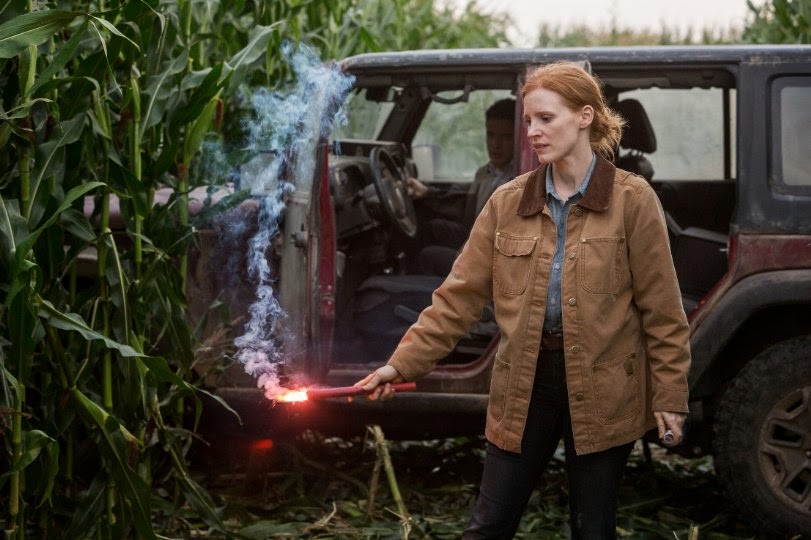 |
| Murphy Cooper gets stuff done. This should have been the movie. |

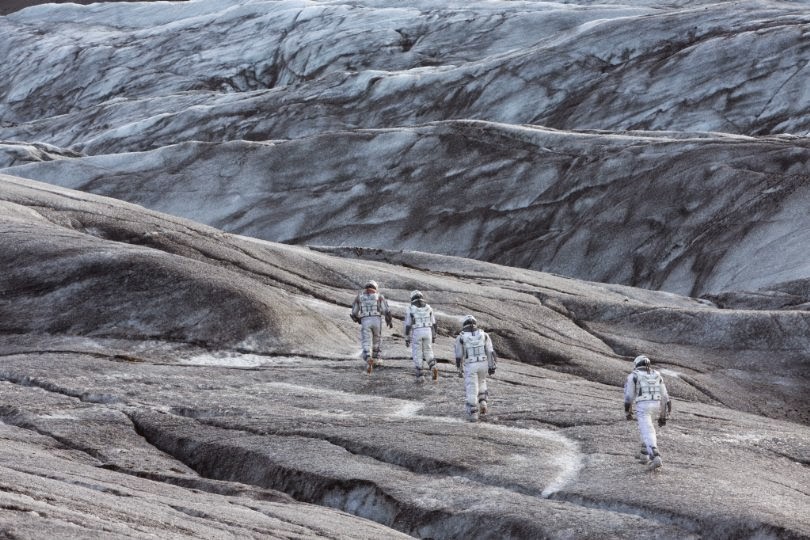
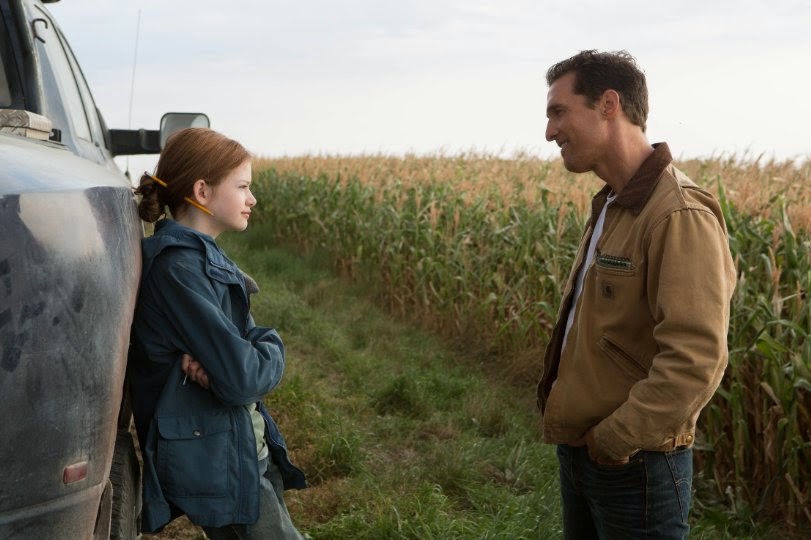
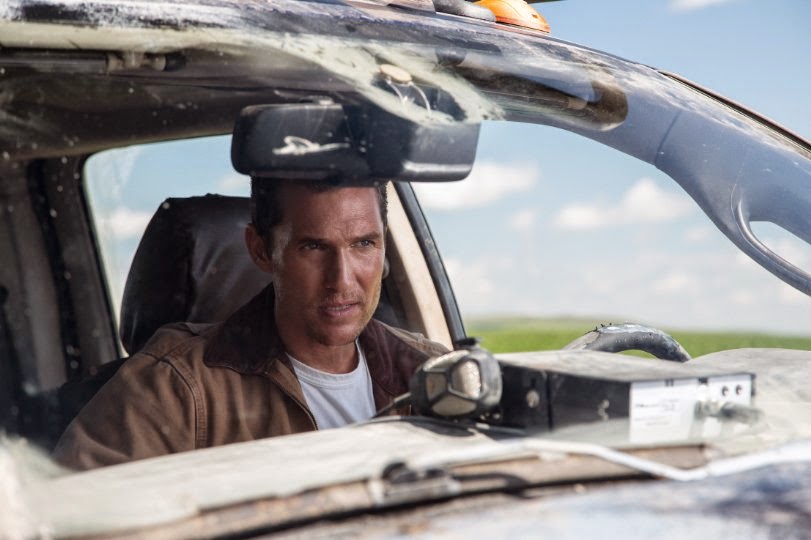

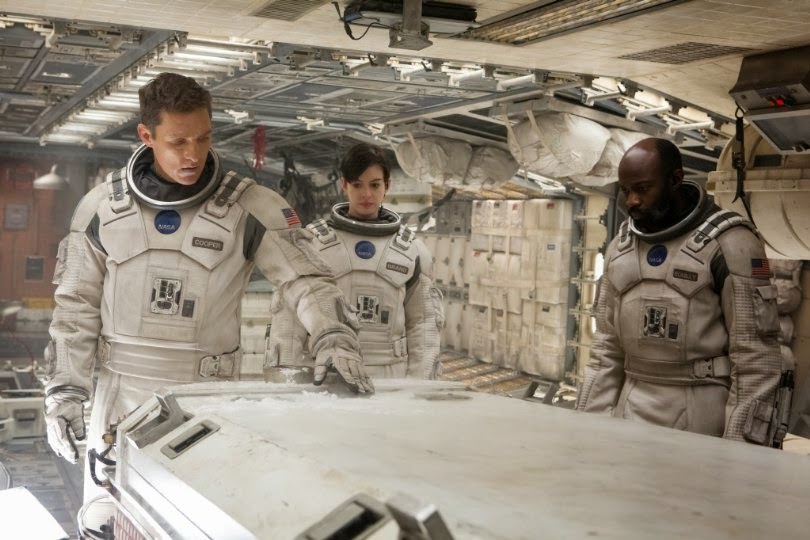

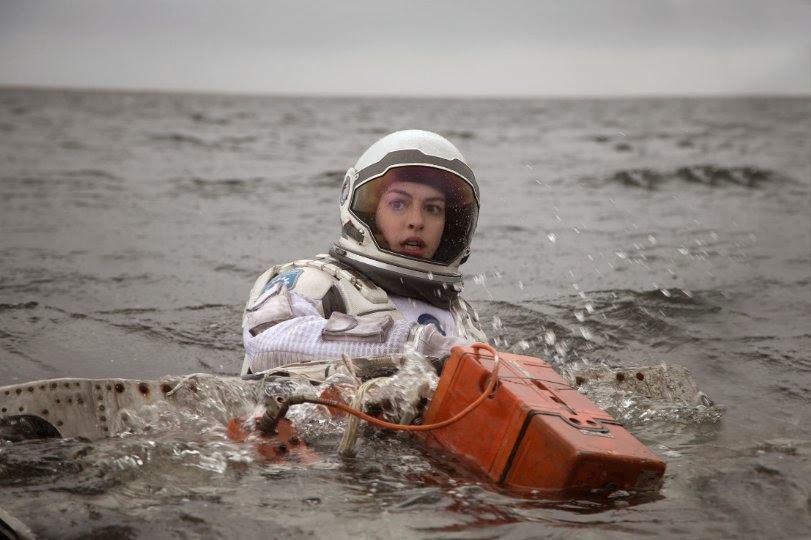

Brand's emotional reactions to the situations around her and her desire to follow her heart are actually born out when it turns out that if Brand had followed her heart, they all would have had a much easier time of things.
ReplyDeleteUnfortunately not. Brand had the right planet according to the science, but if they'd gone there when she said to, Cooper wouldn't have ended up doing the thing it turned out he needed to do, which is what ended up saving the species. Following his heart was vindicated, following her heart (or at least doing so first) was not. Because presumably women's emotions are silly, while men's are truth.
I *do* like that Brand was right about the scientific merits of their options. And I like that she only launched into her love-is-a-force speech when Cooper declared that her love meant she couldn't possibly be objective about the data - so he was really the first one to kick reason out of the argument.
While there is a twist at the end that suggests that the focus of the story the whole way through has actually been Murph and not Cooper, sadly, that's not actually true.
Agreed, though I'm totally tickled by the bit where the medical team burst out laughing when Cooper assumes the station is named after him.
They're the ones most everyone is going to see, and they're the ones that will ultimately have the most impact on our culture.
One of its most memorable lines was that the disaster was such that they had stop thinking about their survival as individuals and start thinking about their survival as a species. That makes the narrowness of represented humanity even more glaring.
Wait, so even though Brand is right, Cooper is absolutely never wrong and everything he does is the right thing to do? Aaaaaaarrrrrrggggh. That is the worst.
DeleteThe scene with the medical team, and the realization that Murph is the hero everyone remembers, is probably my favorite part of the film. It's just so cathartic. Also the part where she kicks him out of her hospital room because she's over it. Awesome.
And yes, the fact that all of this was about "our species" and yet we are implicitly told that only white people survive, that's just alarming.
Wait, so even though Brand is right, Cooper is absolutely never wrong and everything he does is the right thing to do?
ReplyDeleteYep. If they hadn't gone to Matt Damon's planet first, then Matt Damon wouldn't have wrecked everything, they wouldn't have had trouble getting away, Cooper wouldn't have had to dive into the black hole, and so he wouldn't have been able to send the signal back to Murphy.
So Brand had the facts on her side (the science said Edmonson's planet was the right one), the truth on her side (we're shown that it was indeed the right one), and the unknown on her side (love is apparently something that can defy time and space), but Cooper is still right anyway.
Aaaaaaarrrrrrggggh.
That about sums it up.
It's frustrating because I really want to like the way this movie treats women. They're not sexualized, they're shown in positions of power and intelligence, it's just that they're also shown to be completely dependent on Cooper. And that's not okay.
DeleteGreat analysis. I have seen this movie twice and have a weird love of hating it. I feel that way about most Chris Nolan movies. He just can't seem to get past white-man-as-center-of-the-universe and he often makes all the women in his films merely catalysts for the white guy's story.
ReplyDeleteI will take the issue with the whiteness, the representation of only one type of American even further and say that this movie is one giant ad for white imperialism. We messed up our own planet, so we're going to take all the white people and just go take over other planets. Not to mention how creeped out I was about the "surrogates" idea presented by Brand - so you are going to grow people and then you are going to force those people to have more children? Do they even have a say in this? Nothing like being a woman (not that only women can have children but I feel like this was the insinuation) on a new planet and being told your whole purpose in life is to pop out kids for "humanity."
There are so many problematic themes in this movie, it boggles the mind. And yet, it is so enjoyable to watch. I agree with you - these are the films we need to discuss. These are the films seen by *millions* of people, they are the ones that need to start getting this shit right. Thank you for what you do, I love reading your movie reviews!
Nichole, Nolan's job as a filmmaker is to put his own artistic vision on screen. Not yours. Filmmakers are taught to make movies that are personal to them. Pandering to the audience is considered bad filmmaking. That's why this whole "I'm going to over analyze every movie till that movie is no longer fun to watch" thing is very dangerous. Stop trying to take all the joy out of people going to the movies. We go to the movies to escape the horrors of the real world. Movies should never feel like homework.
ReplyDeleteYour narrative of "they are the ones that need to start getting this shit right" screams of artistic censorship. Go create art of your own rather than telling elite filmmakers what they can and can't do with their own art. And I say that as a man of color myself. I wish Nolan would add more diversity to his lead characters, but I don't want any filmmaker forced to make creative choices he or she doesn't want to.
This whole "movies can only show what we randoms on the internet say they can show" line of logic just screams artistic censorship.
ReplyDeleteFEMALE CALL GIRLS KOLKATA
ReplyDeleteFEMALE CALL GIRLS
SEXY CALL GIRLS SERVICE IN KOLKATA
ESCORTS SERVICE IN KOLKATA
KOLKATA FEMALE ESCORT SERVICE
TOP ESCORTS SERVICE KOLKATA
BEST KOLKATA ESCORTS SERVICE
CALL GIRLS SERVICE
ESCORTS SERVICE
ESCORT SERVICE
ESCORTS SERVICE IN KOLKATA
BENGOLI ESCORTS GIRLS
BENGOLI CALL GIRLS KOLKATA
KOLKATA ESCORTS SERVICE
FREE ESCORTS SERVICE KOLKATA
FREE WHATSAAP NUMBER ESCORTS
FREE WHATSAAP NUMBER OF CALL GIRLS
PHONE NUMBER OF ESCORTS SERVICE
FREE PHONE NUMBER ESCORTS SERVICE
MOBILE NUMBER OF ESCORTS SERVICE
https://www.guest-articles.com/education/mcd-level-1-mulesoft-certified-developer-level-1-10-12-2020
ReplyDelete